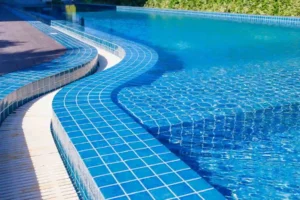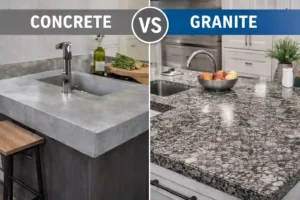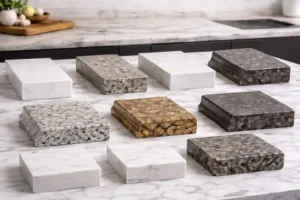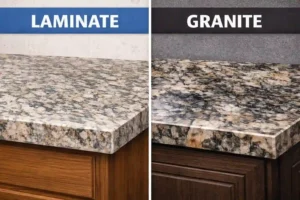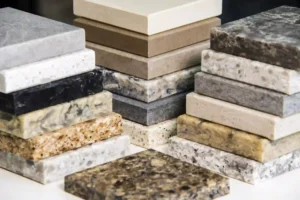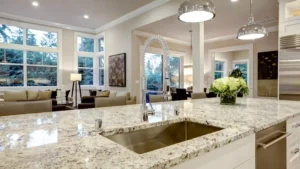A black marble floor is a premium flooring option made from natural metamorphic rock, featuring deep, rich black tones with distinctive veining patterns in white, gold, or gray. This luxurious flooring material has become increasingly popular in modern homes due to its timeless elegance, sophisticated appearance, and ability to create a dramatic visual impact in any space. From sleek modern kitchens to elegant bathrooms and grand entryways, black marble flooring transforms ordinary rooms into extraordinary spaces that exude luxury and refinement.
What Makes Black Marble Special?
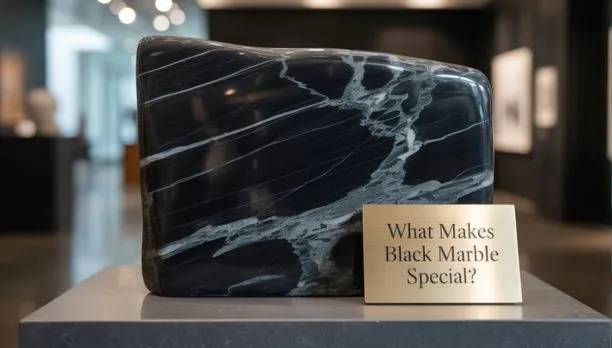
Black marble is formed through a natural geological process in which limestone undergoes intense heat and pressure over millions of years. This transformation creates a dense, durable stone with unique characteristics that make it perfect for flooring applications.
Table of Contents
ToggleNatural Formation and Characteristics
Black marble gets its distinctive dark color from high amounts of carbonate sediments mixed with organic materials that formed under low-oxygen conditions. Many varieties of black marble contain fascinating fossils that tell the story of ancient sea life, making each piece truly unique.
The most striking feature of black marble is its beautiful veining patterns. These natural lines, usually in lighter colors like white, gold, or silver, create stunning contrasts against the dark background. When searching for quality marble slabs near me, look for those with unique veins that formed randomly during the stone’s creation, ensuring that no two pieces are exactly alike.
Types of Black Marble for Flooring
Popular Black Marble Varieties
Marquina Black Marble is perhaps the most famous type worldwide, known for its intense black background and characteristic white veins. This Spanish marble offers excellent uniformity and high production volume, making it widely available for flooring projects.
Indian Black Marble provides another excellent option with its fine-grained texture and high-gloss finish. Also known as Absolute Black or Nero Black Marble, this variety features subtle white and golden veins that add elegance without overwhelming the design.
Noir Saint Laurent from France showcases rich golden veins against a deep black background, creating a luxurious appearance perfect for high-end applications.
Finishing Options
Polished black marble offers the most popular finish for flooring, providing a mirror-like surface that reflects light beautifully. This finish enhances the natural veining and creates that coveted black shiny flooring appearance that many homeowners desire.
Honed finishes provide a matte appearance that’s less slippery and shows fewer water spots, making them practical for high-traffic areas. Bush-hammered or aged finishes work well for outdoor applications where slip resistance is important.
Benefits of Black Marble Floor
Aesthetic Appeal and Versatility
Black marble flooring creates an instant focal point in any room. The deep, rich color provides excellent contrast with lighter walls and furnishings, making spaces appear larger and more dramatic. Whether your style is modern minimalist or traditional luxury, black marble adapts beautifully to different design themes.
The natural veining patterns add visual interest and texture that synthetic materials cannot replicate. Each installation becomes a unique work of art that enhances your home’s overall value and appeal.
Durability and Longevity
When properly installed and maintained, black marble tile flooring can last for a decade. The dense composition of marble makes it highly resistant to cracking, chipping, and normal wear and tear. Unlike softer flooring materials, marble becomes harder and more durable over time.
Marble’s natural resistance to moisture makes it an excellent choice for areas prone to spills and humidity. This characteristic makes it particularly suitable for kitchens and bathrooms where water exposure is common.
Health and Cleanliness Benefits
Unlike carpeting, marble floors don’t harbor allergens, dust mites, or pet dander. Any particles that do accumulate on the surface are easily visible and can be quickly removed with regular cleaning. This makes marble flooring an excellent choice for people with allergies or respiratory sensitivities.
Design Ideas and Applications
Bathroom Black Marble Floor
A bathroom black marble floor creates a spa-like atmosphere that transforms your daily routine into a luxurious experience. The natural water resistance of marble makes it perfect for wet areas, while its elegant appearance elevates the entire bathroom design.
Black marble works exceptionally well with white fixtures and gold accents, creating a classic color scheme that never goes out of style. The reflective surface of polished marble can make smaller bathrooms appear larger and brighter.
Living Room and Common Areas
In living spaces, black marble flooring provides a sophisticated foundation for furniture and decor. The dramatic contrast works beautifully with light-colored sofas, wooden furniture, and colorful artwork. Installing radiant heating beneath marble floors ensures year-round comfort, especially important in colder climates.
Kitchen Applications
Black marble kitchen floors offer both beauty and practicality. The hard surface resists scratches from dropped utensils and can handle heavy foot traffic around cooking areas. However, it’s important to clean spills promptly to prevent staining, especially from acidic substances.
Entryways and Foyers
Grand entryways featuring black marble flooring create an impressive first impression for guests. The durability of marble makes it perfect for high-traffic areas, while its elegant appearance sets the tone for the entire home.
Installation Considerations
Professional Installation Requirements
Installing black marble flooring requires experienced professionals who understand natural stone. Proper installation involves careful subfloor preparation, precise cutting, and expert handling to avoid damage. The weight of marble also requires adequate structural support.
Tile Sizes and Patterns
Black marble tiles come in various sizes, from traditional 12×12 inches to large format 24×48-inch pieces. Larger tiles create a more seamless appearance with fewer grout lines, while smaller tiles offer more design flexibility for patterns like herringbone or checkerboard.
Setting Materials and Adhesives
Use only setting materials specifically designed for natural stone installation. White, non-staining adhesives prevent discoloration that can show through lighter veining. Proper adhesive selection ensures long-term stability and prevents future problems.
Maintenance and Care Guide
Daily Cleaning Routine
Maintaining black marble floors requires gentle, consistent care. Use a dust mop or soft-bristled vacuum daily to remove surface debris that could scratch the stone. Avoid vacuums with rotating brushes that might damage the marble surface.
For regular cleaning, use pH-neutral cleaners specifically designed for natural stone. A simple solution of mild dish soap and water works well for routine maintenance. Always rinse thoroughly to prevent soap residue buildup.
Dealing with Stains and Spills
Clean spills immediately to prevent staining. Blot rather than wipe to avoid spreading the liquid. For stubborn stains, create a paste using baking soda and water, apply it to the stain, and let it sit for several hours before wiping clean.
Sealing Requirements
Apply a penetrating sealer designed for marble to protect against stains and moisture penetration. Reapply sealer every 1-2 years, depending on traffic levels and usage. Proper sealing helps maintain the marble’s appearance and extends its lifespan.
Water Spot Prevention
Black marble, especially polished surfaces, can show water spots more readily than other stones. Use a squeegee in shower areas and dry surfaces after cleaning to prevent mineral deposits. A solution of water and white vinegar effectively removes existing water spots.
Challenges and Considerations
Cost Factors
Black marble flooring represents a significant investment, with material costs ranging from $10-40 per square foot depending on the variety. Professional installation adds $3-7 per square foot to the total cost. However, this investment often increases home value and provides decades of beauty.
Maintenance Requirements
Marble requires more attention than ceramic tile or other synthetic flooring options. Regular sealing, prompt spill cleanup, and proper cleaning products are essential for maintaining its appearance. Some homeowners find this level of care demanding compared to lower-maintenance alternatives.
Scratch and Chip Susceptibility
Being softer than granite, marble can scratch or chip from heavy impacts. Moving furniture without proper protection can leave permanent marks. However, many minor scratches can be professionally polished out, restoring the marble’s original appearance.
Slippery When Wet
Polished marble surfaces can become slippery when wet, creating safety concerns. Consider honed finishes in areas prone to water exposure, or use appropriate rugs and mats to provide traction.
Comparing Black Marble to Other Flooring Options
Marble vs. Granite Flooring
While both are natural stones, granite offers superior scratch resistance due to its harder composition. Granite requires less maintenance and is more resistant to acids. However, marble provides more elegant veining patterns and a more refined appearance.
Marble vs. Ceramic Tiles
Ceramic tiles cost significantly less than marble and offer more color options. However, marble provides superior durability and can last up to 100 years with proper care, compared to ceramic’s 75-year lifespan. Marble also adds more value to your home investment.
Heat Resistance Properties
Marble can withstand temperatures up to 1400°F (760°C) without significant damage, making it suitable for areas near fireplaces or heated floors. However, rapid temperature changes can cause thermal stress, so gradual heating is recommended.
Professional Tips from SF Marble and Granite Inc
As experienced professionals in Lowell, MA, we’ve installed countless black marble floors over our 10+ years in business. Here are some insider tips:
- Always purchase 10-15% extra material to account for cuts and future repairs
- Mix tiles from different boxes during installation for the best color blend
- Consider the room’s lighting when selecting marble varieties – some veining shows better under specific light conditions
- Plan your layout carefully to showcase the most attractive pieces in prominent areas
Transform Your Space with Professional Marble Floor Installation
Ready to elevate your home with the timeless beauty of marble? At SF Marble and Granite Inc., our expert team specializes in marble floor installation that brings out the natural elegance and durability of every stone. We handle every step from precise surface preparation and careful tile placement to flawless finishing, ensuring your new marble floor is both stunning and built to last. Whether you’re dreaming of a luxurious black marble floor or a classic white marble entryway, trust our experience and attention to detail to deliver results you’ll love for years to come. Let us help you create a space that truly shines with professional marble floor installation you can count on.
Final Thought
A black marble floor represents the pinnacle of luxury flooring, combining natural beauty with lasting durability. While it requires proper care and represents a significant investment, the timeless elegance and sophisticated appearance make it worthwhile for discerning homeowners. Whether you’re renovating a bathroom, upgrading your kitchen, or creating a grand entryway, black marble flooring transforms any space into a work of art.
The key to success with black marble flooring lies in professional installation, proper maintenance, and understanding its characteristics. When these factors align, your black marble floor will provide decades of beauty and enhance your home’s value for years to come.
FAQs
How much does black marble flooring cost?
Black marble flooring typically costs $10-40 per square foot for materials, with professional installation adding $3-7 per square foot. Costs vary based on marble type, complexity of installation, and local labor rates.
Is black marble flooring slippery?
Polished black marble can be slippery when wet. Consider honed finishes for better traction, or use appropriate rugs and mats in areas prone to moisture.
How often should I seal black marble floors?
Seal black marble floors every 1-2 years, depending on traffic levels. High-traffic areas may need more frequent sealing to maintain protection against stains and moisture.

